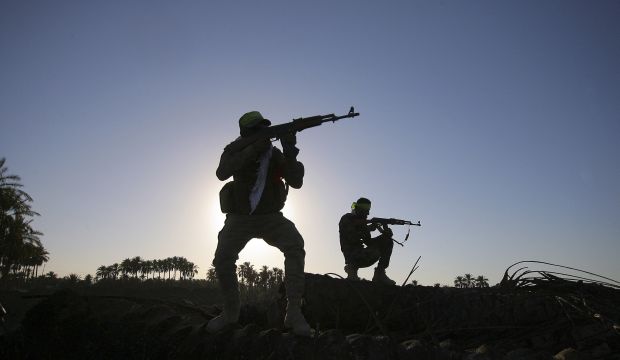
In this Tuesday, October 7 photo Iraqi Shiite militiamen aim their weapons during clashes with ISIS militants, in Jurf al-Sakhar, about 43 miles (70 kilometers) southwest of Baghdad, Iraq. (AP Photo)
Baghdad, Asharq Al-Awsat—At least twelve armed militias are operating openly on the streets of the capital Baghdad, Iraqi political and military figures informed Asharq Al-Awsat warning of an absence of law and order in the country.
Armed militias have increased their presence across Iraq as part of local and national attempts to combat advancing Islamic State of Iraq and Syria (ISIS) fighters. The jihadist group continues to entrench its presence across Iraq and Syria despite the formation of an international anti-ISIS coalition that is carrying out airstrikes against ISIS positions and moving to provide greater support to Iraqi and Kurdish military forces.
Iraqi independent politician and ex-MP Izzat Al-Shabandar told Asharq Al-Awsat: “Popular militias are in control of the Iraqi street today,” adding that “Iran is providing material and moral support to these militias which are fighting against ISIS at a time when the Iraqi military has failed to confront the threat posed by this terrorist organization.”
Shabandar, who is a former member of Iraqi Vice President and former Prime Minister Nuri Al-Maliki’s State of Law coalition, warned of potential blow-back against the Iraqi state from these Shi’ite majority militias.
“After the fight [against ISIS] is over these militias will return to Baghdad to demand what they believe they are entitled to in terms of participation in the decision-making process regarding security. When the government refuses to respond, they will turn their arms on the government,” he warned.
Iraqi Prime Minister Haider Al-Abadi, who heads a national unity government, has sought to reorganize Iraq’s militias and retake control of the flow of arms as a prelude to leading the fight against ISIS. However Shabandar said that this would be easier said than done. “Iraq is seeking to use the Badr Organization, Asa’ib Ahl Al-Haq and battalions affiliated to Iraq’s Hezhollah movement to rule the country,” he warned.
Military and security expert Maj. Gen. Abdul Karim Khalaf confirmed that at least 12 armed militias are present in the capital Baghdad, outside of the control of the central government, warning against the “absence of law and order which is allowing the proliferation of arms outside of the control of the state.”
He said that the presence of these militias “threatens the safety and security of the Iraqi people and depreciates the prestige of the security apparatus that are no longer capable of controlling the presence of arms in the streets of the capital.”
Khalaf, who previously served as Iraqi Defense Ministry spokesman, told Asharq Al-Awsat that it is the Iraqi military’s inability to effectively combat ISIS that was allowing these armed militias to fill the void. He called for these militias, mostly consisting of volunteer fighters, to serve under the umbrella of the “National Guard” under the authority of the state.
“Today, all the militias are operating in Iraq’s streets without any oversight . . .There are numerous militias roaming Baghdad’s streets and it is very difficult to control them,” he warned.
However, media adviser to the Iraqi Defense Ministry, Gen. Mohamed Al-Askari, denied that armed militias were present in Baghdad.
